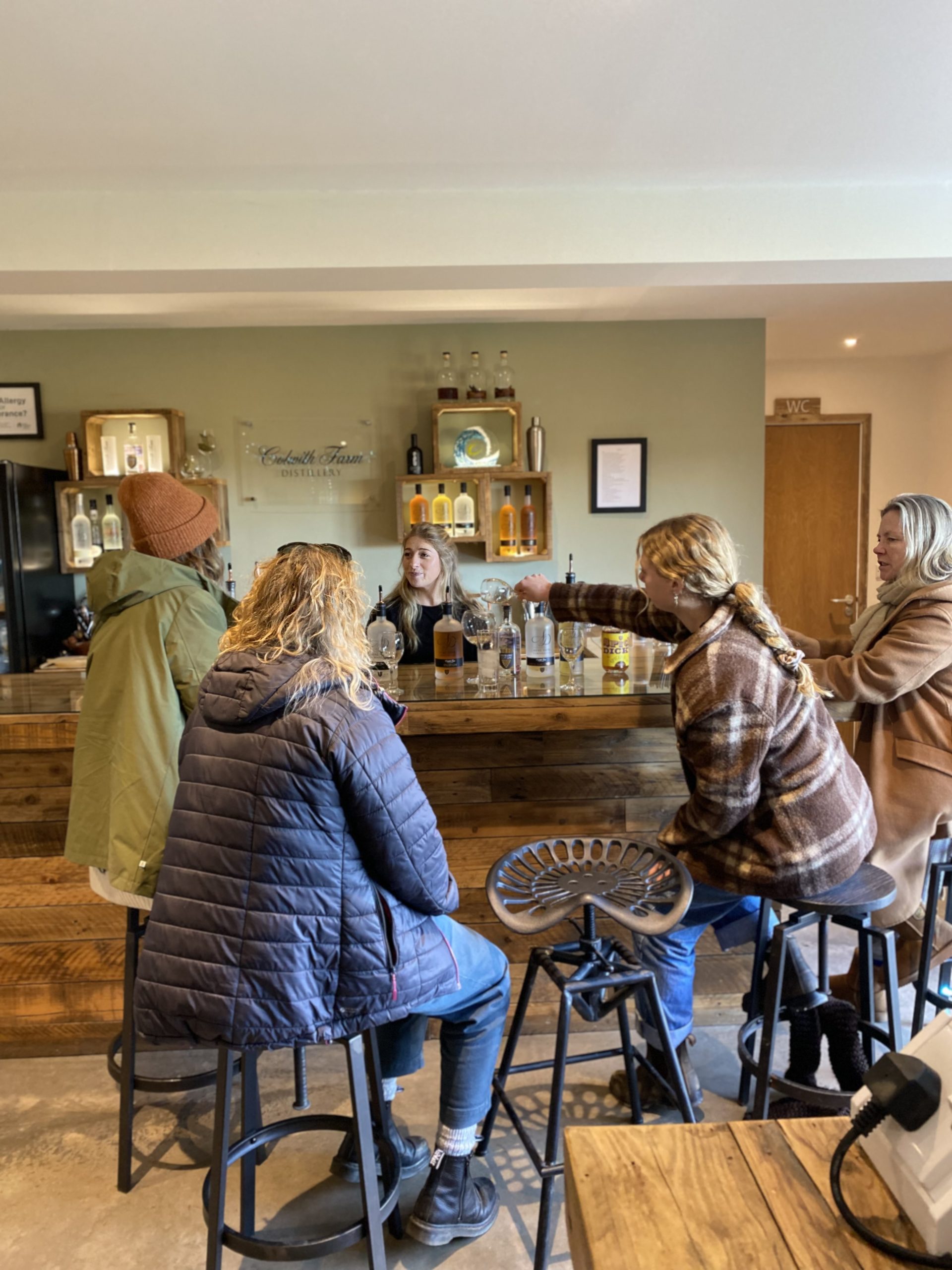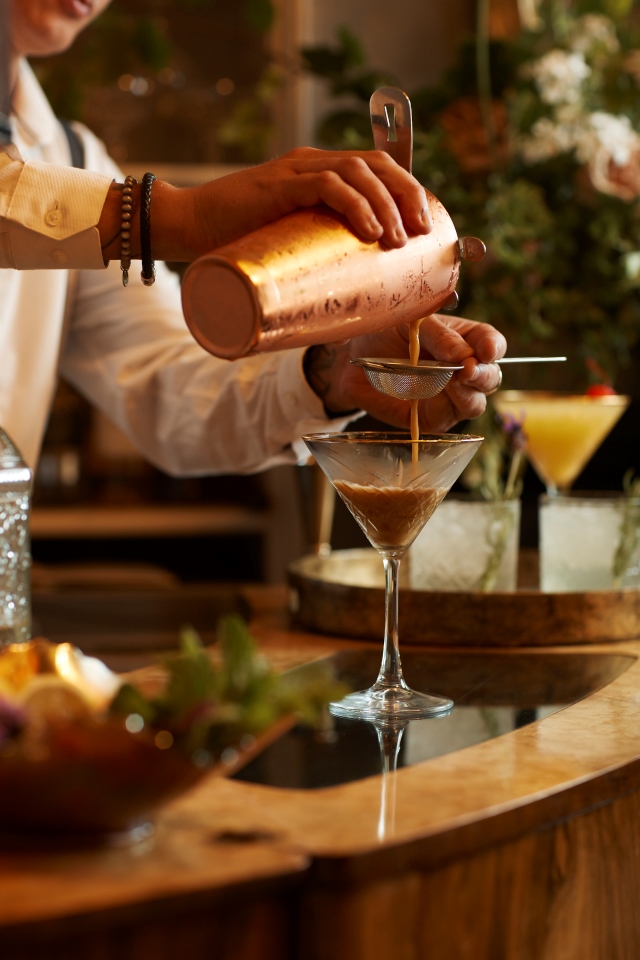
Our bar is stocked with lots of lovely local spirits, and it feels a real celebration of Cornish produce. The bespoke cocktails we create are a toast to the local businesses inspiring us (and creating delicious drinks!). As Treseren’s new Sustainability Coordinator, I am thrilled to have been setting sustainability projects, big and small, in motion. Since the first beautiful small wedding we hosted, we have proudly sourced as locally as possible and we are happy to further extend our selection of sustainable spirits. Not only to put Cornish brands at the front and centre of Lovedays bar, but to reduce food miles, carbon emissions, and plastic waste whilst doing so.
Introducing…
We are so happy to introduce the new spirit in our collection: Aval Dor Vodka, made at Colwith Farm Distillery. Their smooth and creamy vodka, platinum winner at the San Francisco World Spirits Competition, has very humble origins. Aval Dor is the Cornish name for potato! For 200 years, Steve Dustow’s family have been growing potatoes at Colwith Farm, and they still grow acres of potatoes for making chips and crisps, as well as martinis.
Sustainable Swap
Aval Dor vodka is made from ‘wonky’ potatoes grown on the farm: a solution to tonnes of food waste. With sustainability at its core, the distillery is powered completely by photovoltaic solar panels on the roof, and rainwater collects in butts, used during the spirit cooling process. Steve, his father and brother (pictured below) rotationally plant potatoes to allow fields time to recover, supporting biodiversity and carbon sequestration. They deliver in an electric van, and we are excited to be buying their vodka in refillable pouches which can eventually be recycled, avoiding the energy intensive production of lots of glass bottles.
Based in the heart of the Cornish countryside just 23 miles away, this swap has also been a huge saving for transport miles. Our previous vodka came from Finland!
Visiting The Distillery
On a cold and crisp morning this January, we drove up the A30 and through the Lostwithiel valley, to see just how potato becomes vodka. The lovely Amy walked us through the vodka making process – who knew there were so many different steps! She showed us how they skin one tonne of potatoes at a time… we would quite like to borrow this machine next time we make apple crumble for autumn welcome meals. Next, they ferment the potatoes in a huge, repurposed still sourced from Scotland and previously used to make caramels. We tentatively smelt the potato ‘wine’ at this stage and were all pleasantly surprised to find that the scent was sweet, and very intriguing.
A steel distiller then heats the liquid, which passes through copper coils before condensing, repeated 30 times. The spirit is separated by molecule size into ‘heads’, ‘hearts’ and ‘tails’, and they keep only the best spirit. Amy assured us that the liquid which doesn’t make the cut is not wasted, rather is added back into the first distilling stage. She encouraged us to try the vodka which comes out at this stage at a staggering ABV 96%. We each tasted just a drop, which tasted very strong, particularly at 11am!
Local Flavours
We were interested to see saw how wonderful flavours are infused into the vodka. Steve sources ingredients grown and sourced locally, from rosemary grown at the Eden Project to blackcurrants from a farmer down the road. These are steeped, essentially in a giant tea bag, allowing their flavours to infuse the Aval Dor vodka. The final stage is to blend the 96% spirit with water, pumped from an aquifer below the distillery, to reach that magic 40% ABV. Finally, each bottle is hand labelled, which Amy was not too pleased about! She did agree that they look beautiful, and we were all so impressed by Amy’s painting of botanicals and florals, showcased on the Distillers Cut gin label.
Time To Taste
Having seen how they make the vodka, we were very excited to taste it! It was quite the line up of vodkas and gins. Strikingly orange in colour, Cornish Seaberry Vodka caught our interest, and we found it uniquely tart and refreshing. The seaberries are grown by Seth, friend of Colwith Farm’s, based just 2 miles down the road. Alongside the classic Aval Dor vodka, we are also going to stock their Vanilla Vodka, which has an exquisite floral flavour without being too sweet. Our new espresso martini recipe, featured below, benefits from this added complexity.
The Power Of Small
We met Steve after our tour, and he told us all about his mission to make a world-class spirit from potatoes. The initial spark of an idea prompted four years of research into the spirit making process, his perfectionism continuing today, said Amy. Steve’s genuine commitment to making vodka from scratch and his deeply held belief in doing things the right way stood out to us. After all, we are all for keeping things small and bespoke, perfecting the details. We are proud to be working with a company who shares our sustainability values and is leading the drinks industry from Cornwall.
Espresso Martini Recipe
Of course, with the arrival of our new bottles (and pouches) of Aval Dor Vodka, we were eager to try it out in one of our favourite cocktails, our ‘1853 Martini’. This classic cocktail is always popular as a post- wedding dinner tipple, starting off the evening celebrations. Very excitingly, we think we have perfected our new espresso martini recipe.
Ingredients
50ml Aval Dor Vanilla Vodka
25ml fresh espresso
25ml coffee liqueur – we use our homemade coffee saccharum
10ml sugar syrup (if you like it a little sweeter)
Method
- Fill your cocktail shaker and a martini glass with ice to cool.
- Measure the ingredients into your smaller cocktail shaker cup.
- Pour over the ice in your shaker and be sure to close this well.
- Give this a long, vigorous shake for 15 seconds, until the shaker is really cold to touch. This will create a thick crema on your espresso martini.
- Discard the ice from your martini glass and double strain your cocktail into this, shaking to get all of the espresso crema.
- Top with 3 coffee beans, and enjoy.
Our homemade coffee saccharum
We already make the syrups for our cocktails in our bar, eliminating packaging and transportation, so we thought it makes total sense to make coffee liqueur in house too. This is a perfect solution to food waste too, since we reuse coffee grounds after breakfast. We can’t believe we have not been doing this all along! Using brown sugar gives a lovely caramelly flavour, and we choose to use white rum as our spirit, although this can be dark rum, vodka, even tequila, if you fancy.
Ingredients
1 part coffee grounds
1 part sugar
1 part rum
2 parts strong coffee
Method
- Mix together the coffee grounds and sugar in a bowl, until this comes together as a coffee slurry.
- Stir in your rum, followed by your fresh coffee (hot or cold), mixing this well to dissolve the sugar.
- Putting a filter paper inside a funnel, drain the coffee liquid into a glass or plastic bottle. This will sift through slowly, so you may wish to leave it for an hour to do its thing.
- You can then keep your coffee saccharum alongside your other spirits and liqueurs. It is perfect in espresso martinis!
With our first wedding of the year this weekend, we look forward to many evening celebrations to come, invigorated by our special espresso martinis. We are so happy to be partnering with a Cornish company leading the way in creating exquisite, sustainably produced spirits from scratch.

































